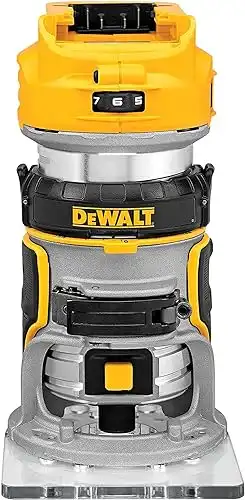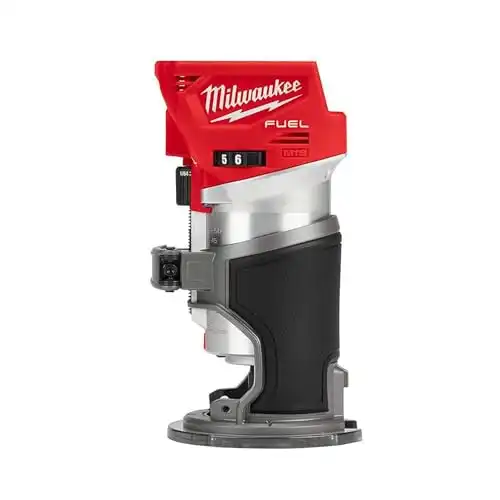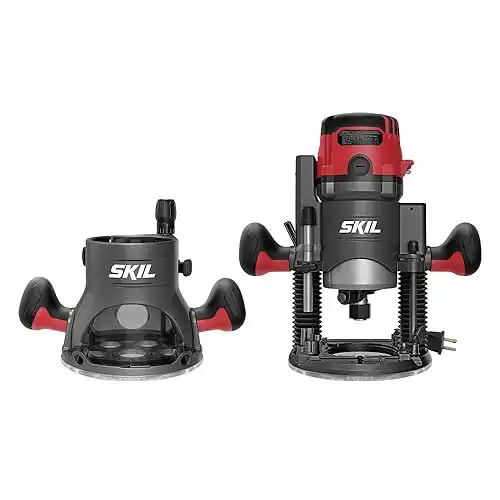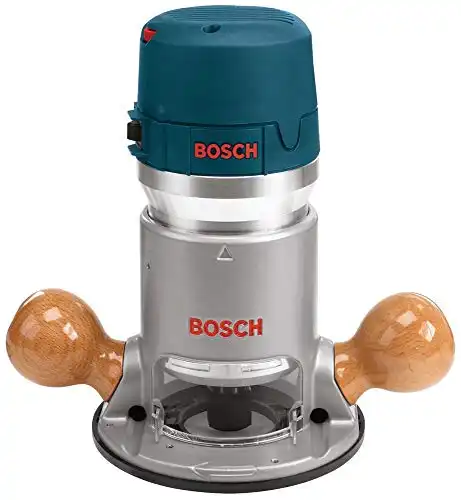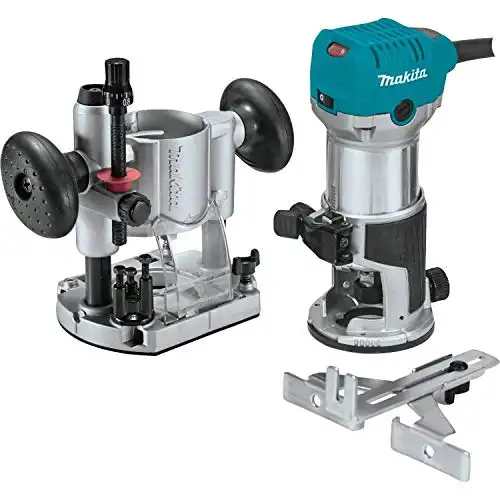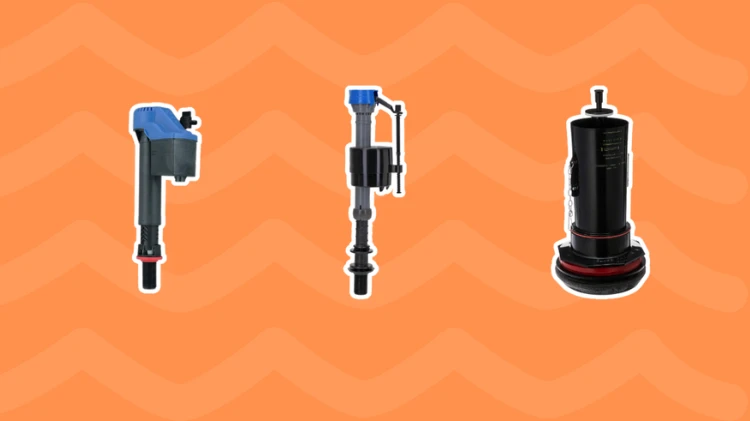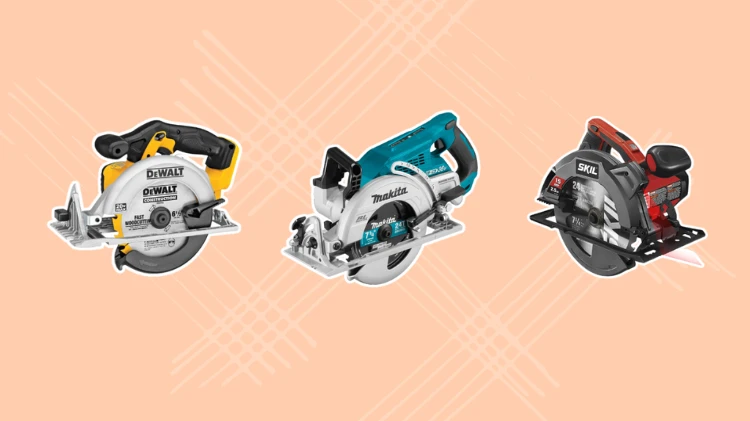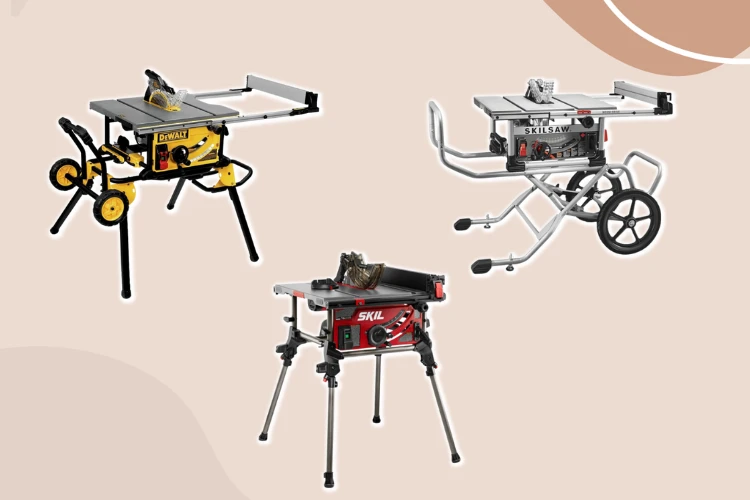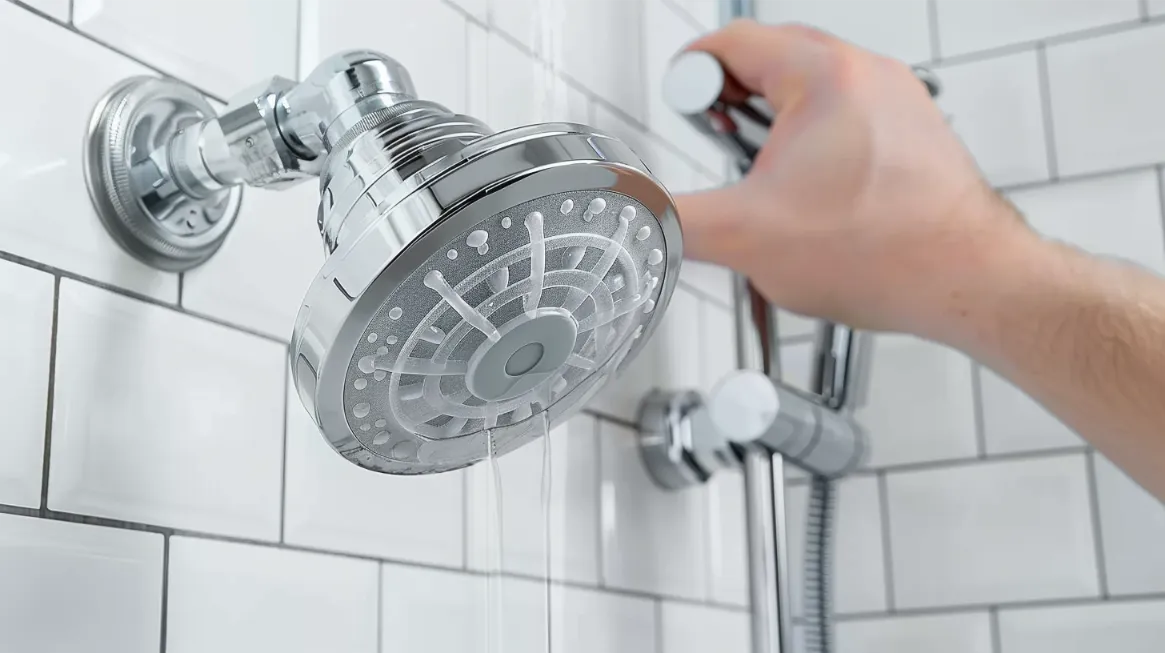Searching for the ultimate guide to the best wood routers?
Wood routers have become indispensable at the heart of many woodworking, carpentry, and DIY projects.
With a market expected to soar from $166.0 million in 2023 to a whopping $288.2 million by 2033, it’s clear that these versatile tools are in high demand.
From creating artistic masterpieces to tackling home renovation projects, wood routers are a favorite among enthusiasts and professionals.
Dive into our roundup of the top picks, equipped with the stats to back your choice, and find the perfect tool to elevate your craft.
Let’s cut to the chase and explore the options that will carve your path to success in woodworking.
Our Top Picks
- Best Overall: DEWALT 20V Max XR Cordless Router
- Best Cordless: Milwaukee’s Cordless Compact Router
- Budget Pick: SKIL 14 Amp Plunge and Fixed Base Router Combo
- Best Corded: BOSCH 1617EVS 2.25 HP Electronic Fixed-Base Router
- Best Router Kit: Makita RT0701CX7 1-1/4 HP* Compact Router Kit
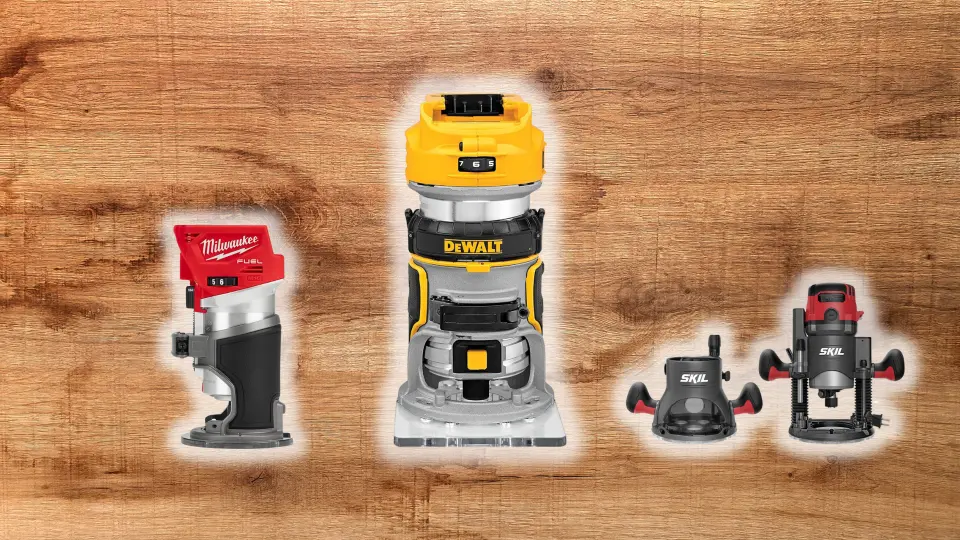
#1 Best Overall
DEWALT 20V Max XR Cordless Router
The DEWALT 20V Max XR Cordless Router is a powerful, versatile, and convenient tool that delivers exceptional performance for professional woodworkers and serious DIY enthusiasts, making it an excellent choice for those seeking a high-quality cordless routing solution.
Why It’s Worth Your Attention: It is a powerful, precise, and incredibly convenient cordless routing solution that delivers professional-grade results without the hassle of cords.
Things to Consider: For prolonged use or demanding projects, you may need to invest in additional batteries or opt for higher-capacity options.
Key Features
- A brushless motor delivers corded router power without the cord.
- Variable speed control from 16,000 to 25,500 RPM for optimal performance
- Dual LED lights provide improved visibility during operation
- Instant brake stops the bit rotation immediately after the trigger release.
- Compatible with the DEWALT 20V Max battery system for cordless convenience
As a professional woodworker with over ten years of experience, I recently tested the DEWALT 20V Max XR Cordless Router in my workshop. I must say, I am thoroughly impressed with its performance and versatility.
First and foremost, the cordless design is a revolutionary advancement. The freedom to move around my workspace without being tethered to a power outlet has significantly improved my workflow efficiency. The router is powered by DEWALT’s reliable 20V Max XR battery, which provides ample runtime for most of my projects.
The router itself is well-built and ergonomically designed. It feels comfortable in my hands, and the weight is well-balanced, reducing fatigue during extended use. The depth adjustment mechanism is precise and easy to use, allowing me to achieve accurate and consistent results.
I particularly appreciate the router’s variable speed control, enabling me to match the speed to the specific material and task. This feature and the router’s brushless motor always ensure clean and smooth cuts.
Changing bits is a breeze thanks to the router’s spindle lock and the included wrench. The LED work light is a nice touch, providing additional visibility in dimly lit areas.
Overall, the DEWALT 20V Max XR Cordless Router has become an essential tool in my workshop. Its cordless convenience, power, and precision make it an excellent choice for professional woodworkers and serious DIY enthusiasts. I highly recommend this router to anyone looking for a reliable and versatile tool to tackle many routing tasks.
#2 Best Cordless
Milwaukee’s Cordless Compact Router,18.0 Voltage
Milwaukee's Cordless Compact Router is a powerful, precise, and portable tool that offers excellent performance and versatility for DIY enthusiasts and professionals, making it a valuable addition to any workshop.
Why It’s Worth Your Attention: It stands out for its powerful performance, precision, and portability, making it an attractive choice for DIY enthusiasts and professionals seeking a versatile, easy-to-use tool that delivers excellent results without the hassle of cords.
Things to Consider: The plunge base is sold separately and can be expensive, and some users may find the collet to be tight, making bit changes more challenging.
Key Features:
- Cordless design for unmatched mobility and freedom of movement
- Compact size and lightweight for precision work and tight spaces
- Powerful brushless motor delivers ample torque for most routing tasks
- Dual base plates offer versatility for different applications
- Integrated dust collection system keeps your workspace clean
No more tangled cords or limited mobility – I can easily move around my workspace and tackle projects. The compact size is perfect for precision work and getting into tight spaces while still packing plenty of power for most routing tasks.
The router is incredibly user-friendly, with simple depth adjustments and quick bit changes. I particularly appreciate the dual base plates, which offer versatility for different applications. The included dust collection attachment is a nice bonus, helping to keep my work area clean.
In terms of performance, the Milwaukee Cordless Compact Router exceeded my expectations. It easily handled edge profiling, hinge mortising, and small dado cuts. The impressive battery life allows me to work for extended periods without interruption.
One minor drawback is that the plunge base is sold separately and can be expensive. However, the fixed base has been sufficient for most of my needs.
I highly recommend Milwaukee’s Cordless Compact Router for DIY enthusiasts and professionals. Its power, precision, and portability make it valuable to any tool collection. In my experience, it has greatly improved my workflow and the quality of my projects.
#3 Budget Pick
SKIL 14 Amp Plunge and Fixed Base Router Combo
The SKIL 14 Amp router combo is an excellent value. It packs professional-grade features and performance into an affordable package, making it my top-budget pick for DIYers and value-minded pros.
Why It’s Worth Your Attention: It has an impressive combination of power, precision, and user-friendly features at an attractive price point, making it a compelling choice for DIYers and value-conscious pros seeking a versatile, feature-rich router kit.
Things to Consider: The stock sub-base plate openings are slightly undersized, which may limit the use of large-diameter bits without purchasing or making custom sub-base plates.
Key Features:
- Powerful 14 amp, 2.5 HP motor delivers ample power for routing hardwoods
- Intuitive digital speed control with LCD suggests optimal RPMs based on bit type and material
- Includes both fixed and plunge bases for added versatility right out of the box
- Soft start, electronic speed control, and ergonomic handles enable comfortable, controlled use
- Dual LED work lights, easy depth adjustments, and dust collection ports round out a feature-rich package
As a home improvement expert, I recently had the chance to put the SKIL 14 Amp Plunge and Fixed Base Router Combo to the test on several projects. I have to say, this router exceeded my expectations in terms of both power and versatility.
The 14 amp, 2.5 HP motor provides ample power to handle hardwoods easily. I love the electronic speed control LCD, which suggests the optimal speed based on the bit type and material. This takes the guesswork out of setting the right RPMs. The soft start is also a great safety and control feature.
Having both fixed and plunge bases included adds a ton of flexibility. Switching between them is a breeze. The ergonomic handles provide a comfortable, secure grip and help reduce fatigue during extended use. The LED lights around the collet are also convenient for illuminating the work area.
Depth adjustments are precise and simple with the coarse and micro adjustment settings. When hooked to a shop vac, the dust collection adapters keep the work area clean.
Overall, the SKIL router is thoughtfully designed, robustly built, and delivers excellent performance at a reasonable price. Whether you’re a DIYer or a pro, this router can handle various routing tasks. The included accessories and backed by a 1-year warranty make it an exceptional value. I would highly recommend adding this router to your tool arsenal.
#4 Best Corded
BOSCH 1617EVS 2.25 HP Electronic Fixed-Base Router
The Bosch 1617EVS is a powerful, versatile, and reliable 2.25 HP router that delivers outstanding performance for a wide range of woodworking tasks, making it an excellent choice for both professionals and serious DIY enthusiasts.
Why It’s Worth Your Attention: Its powerful 2.25 HP motor, precise electronic variable speed control, microfine depth adjustment system, soft-start feature for smooth operation, and the ability to make above-table bit height adjustments, making it an exceptional choice for both professional woodworkers and serious DIY enthusiasts.
Things to Consider: You should weigh factors such as the occasional dust accumulation in the power switch, which may require periodic cleaning, and the need for two wrenches to change bits, which can be cumbersome when mounted under a table.
Key Features:
- 2.25 HP powerful motor for tackling demanding woodworking projects
- Electronic variable speed control (16,000 – 25,000 RPM) for optimal performance with different bit sizes and materials
- The soft-start feature reduces startup torque for smoother operation.
- Microfine depth adjustment system allows precise bit depth settings
- Includes both 1/4″ and 1/2″ collets for versatility with different shank sizes
I’ve been using this router for various projects, from cabinetry and furniture making to intricate trim work, and it has consistently delivered outstanding results.
One of the standout features of the Bosch 1617EVS is its powerful 2.25 HP motor, which provides ample power to handle even the toughest hardwoods with ease. The electronic variable speed control allows for precise adjustments, ensuring optimal performance with different bit sizes and materials. The soft-start feature is a welcome addition, reducing startup torque and enhancing overall control.
The fixed base is well-designed and offers excellent stability, while the wooden handles provide a comfortable and secure grip during operation. The depth adjustment system is intuitive and accurate, allowing for precise settings and repeatability. I particularly appreciate the ability to make fine adjustments from above the table when the router is mounted, saving time and effort.
In terms of build quality, the Bosch 1617EVS is top-notch. The components are well-machined, and the overall construction feels solid and durable. The included 1/4″ and 1/2″ collets are high quality and securely hold bits.
While the router’s performance is impressive, it’s worth noting that the switch may be prone to dust accumulation, which can cause intermittent operation. Regular cleaning and maintenance can help mitigate this issue.
Overall, the Bosch 1617EVS is a powerful, versatile, and reliable router that has become an indispensable tool in my workshop. Its precision, power, and ease of use make it an excellent choice for professionals and serious DIY enthusiasts.
#5 Best Router Kit
Makita RT0701CX7 1-1/4 HP* Compact Router Kit
The Makita Compact Router Kit is a versatile, powerful, and well-designed tool that offers excellent value for professionals and dedicated DIYers, making it a top choice for a wide range of routing tasks.
Why It’s Worth Your Attention: Its powerful 1-1/4 HP motor, versatile fixed and plunge bases, and user-friendly features like soft-start technology and easy base changes, all in a compact, ergonomic design that delivers precision and control in a wide range of routing tasks.
Things to Consider: The lack of an included edge guide for the plunge base and limited compatibility with some aftermarket accessories may require additional purchases or modifications for certain applications.
Key Features:
- Powerful 1-1/4 HP motor with variable speed control for optimal performance in various materials
- The versatile kit includes both fixed and plunge bases for a wide range of routing tasks.
- Smooth and easy base changes with the convenient latch lock system
- The soft-start feature ensures controlled startups, reducing kickback risk and improving user safety.
- Ergonomic, compact design allows for excellent maneuverability and control, even in tight spaces.
From the moment I unboxed it, I was impressed by its solid construction and ergonomic design.
One of the standout features of this router is its compact size, which makes it incredibly maneuverable and easy to handle, even in tight spaces. Despite its small stature, it packs a powerful punch, effortlessly cutting through various materials with its 1-1/4 HP motor. The soft-start feature is a game-changer, ensuring smooth and controlled startups and reducing the risk of kickback or losing control.
What sets the Makita RT0701CX7 apart from its competitors is that it includes fixed and plunge bases in the kit. The fixed base is perfect for edge routing, trimming, and other surface-level tasks, while the plunge base allows for precise depth control, making it ideal for mortising and inlay work functions. Switching between the two bases is a breeze, thanks to the latch lock system.
The router was well-balanced and comfortable during my projects, even during extended periods. The variable speed control allowed me to adjust the motor speed to suit the material and bit size, ensuring optimal performance and clean cuts. The dust collection system, while not perfect, did a decent job of keeping my workspace tidy.
One area where the Makita RT0701CX7 could improve is the edge guide. While functional, it feels flimsy and could benefit from a more robust design. Additionally, the lack of an edge guide for the plunge base is a minor inconvenience, as purchasing an additional adapter is required.
Overall, if you’re in the market for a compact, versatile, and powerful router that can handle a wide range of tasks, the Makita RT0701CX7 1-1/4 HP Compact Router Kit is an excellent choice. Its combination of performance, ease of use, and value for money make it a standout in its class and a highly recommended tool for professionals and dedicated DIYers.
What to Look for in a Wood Router
A wood router is one of the most versatile and essential power tools for any woodworking shop. Whether you’re a professional carpenter, serious hobbyist, or DIY enthusiast, investing in a quality router will greatly expand your woodworking capabilities. However, choosing the right router can be overwhelming with so many options on the market. In this comprehensive guide, we’ll break down the key factors to consider when selecting a wood router to help you make an informed decision.
Router Type
The first decision is what type of router best suits your needs. There are three main types:
- Fixed Base Routers: In a fixed base router, the motor is mounted in a fixed housing, and the cutting depth is adjusted by moving the motor up or down. These routers excel at edge work like cutting rabbets, chamfering, and flush trimming. They’re generally lighter, more compact, and easier to control than plunge routers, making them a good choice for beginners or those primarily doing edge work.
- Plunge Routers: Plunge routers have bases that allow the motor to be lowered or “plunged” into the workpiece from above. This makes them ideal for cutting grooves, dadoes, mortises, and other interior cuts that don’t start from the board’s edge. Plunge routers offer more versatility but can be more challenging to control, especially for novices.
- Combo Routers: Many manufacturers offer combo kits with a fixed and plunge base for the same motor. This gives you the best of both worlds – the precision of a fixed base for edge work and the versatility of a plunge base for interior cuts. If your budget allows, a combo kit can be a great investment.
Power and Speed
The power and speed of a router determine what materials it can handle and what bits it can use effectively. Here’s what to look for:
- Horsepower: Router power is measured in horsepower (HP). Compact palm routers typically have 1-1.5 HP motors, mid-size routers range from 1.5-2.5 HP, and heavy-duty models can have 3+ HP. More power allows the router to handle tougher wood and larger bits. A 1.5-2.5 HP mid-size router is sufficient for most home workshops.
- Variable Speed: Many routers feature variable speed control, allowing you to dial the optimal RPM for different bit sizes and materials. Larger bits require slower speeds for safe operation, while smaller bits can run at higher speeds. Variable speed is critical if you use bits over 1″ in diameter.
- Soft Start: This feature gradually ramps the motor up to full speed when you turn it on rather than starting at full power immediately. This reduces the torque on your wrists and helps prevent the router from jerking or twisting out of your hands at startup.
- Electronic Feedback Circuitry: High-end routers often have electronic feedback circuitry that monitors the load on the motor and adjusts the power to maintain a consistent speed. This is especially helpful when routing harder woods or taking deep cuts that might bog down a lesser router.
Collet Size
The collet is the part of the router that grips the shank of the router bit. Routers typically come with either 1/4″ or 1/2″ collets, and some have both.
- 1/4″ Collets: Most compact palm routers and some mid-size models have 1/4″ Collets. This is fine for most trimming and edge-forming bits but limits you to bits with 1/4″ shanks.
- 1/2″ Collets: Heavy-duty routers and many mid-size models have 1/2″ collets. This allows you to use bits with 1/2″ shanks, which are less prone to vibration and provide more stability for larger cutters. If you plan to use raised panel bits, large chamfer bits, or other cutters over 1″ in diameter, you’ll need a 1/2″ collet.
- Dual Collets: Some routers come with 1/4″ and 1/2″ collets or an adapter sleeve, allowing a 1/2″ collet to hold 1/4″ bits. This will enable you to use a broader range of bit sizes without needing multiple routers.
Depth Adjustment
Precise depth adjustment is crucial for routing clean, consistent profiles and joints. Here are some features to look for:
- Micro-Adjust Dials: Many routers have micro-adjust dials or knobs that allow you to fine-tune the bit height in increments as small as 1/128″. This is especially helpful for dialing the perfect fit on joinery cuts like dadoes and rabbets.
- Depth Stops: Depth stops allow you to preset the maximum cutting depth, which is handy for making repetitive cuts to a consistent depth. Some routers have multiple depth stops set to different heights for making stepped cuts.
- Depth Scales: Clear, easy-to-read depth scales make it simple to set your cutting depth without measuring each time. Look for scales with fine increments and large, high-contrast markings.
- Above-Table Adjustment: If you plan to mount your router in a table, look for models that allow you to adjust the bit height from above the table. This is much more convenient than reaching under the table to make adjustments.
Ergonomics and Dust Collection
Comfort and control are key considerations, especially if you use your router for extended periods. Here’s what to look for:
- Handle Design: Routers come with a variety of handle styles, including knob handles, D-handles, and pistol grips. D-handles and pistol grips tend to offer better control and comfort than knob handles. Some models have removable handles that can be repositioned for different grips.
- Weight and Balance: A well-balanced router is easier to control and causes less fatigue during long routing sessions. Generally, lighter routers are easier to maneuver, but heavier models may offer more stability and dampen vibration better.
- Dust Collection: Routers create a lot of chips and dust, which can obscure your workpiece and create a breathing hazard. Many routers have built-in dust ports that allow you to connect a shop vac or dust extractor. Some even have clear dust shields surrounding the bit to contain debris while allowing visibility.
Base Features
The router’s base is what rides along your workpiece or template, so it plays a big role in the accuracy and quality of your cuts. Here are some base features to consider:
- Base Material: Router bases are typically made of either metal (usually aluminum) or high-impact plastic. Metal bases are generally more durable and provide a smoother, consistent glide over the work surface. Plastic bases are lighter and less expensive but may not be as soft or stable.
- Base Openings: The size and shape of the opening in the router base affect visibility and chip clearance. Wide, clear base openings make it easier to see your workpiece and allow chips to escape, preventing buildup that could affect your cut.
- Edge Guide: Many routers come with an edge guide attachment that rides along the edge of your workpiece to help rout straight lines and grooves parallel to the edge. Look for an edge guide that’s sturdy, easy to adjust, and has a fine micro-adjustment knob for precise positioning.
- Template Guides: If you plan to use your router with jigs or templates (for cutting shapes, inlays, or joinery), ensure the base is compatible with template guide bushings. These metal collars fit into the base and ride along the edge of a template, allowing you to route a duplicate of the template shape.
Brand and Warranty
Finally, consider the brand’s reputation and the warranty coverage when choosing a router. Stick with well-known, reputable brands like Bosch, DeWalt, Makita, Milwaukee, Porter-Cable, or Festool. These brands have a proven quality, reliability, and customer service track record.
Look for a router with a robust warranty – preferably at least one year, with some high-end models offering up to three years of coverage. A longer warranty period indicates that the manufacturer stands behind the durability and reliability of their product.
Final Verdict
Choosing the Best Wood Router for Your Needs After thoroughly testing and comparing the top wood routers on the market, it’s clear that each has its strengths and is suited for different users and applications. Here’s a summary of our findings:
The DEWALT 20V Max XR Cordless Router is our top pick for its exceptional performance, versatility, and cordless convenience. Its powerful brushless motor, precise depth adjustments, and ergonomic design make it a standout choice for professionals and serious DIYers. The freedom of movement provided by the cordless design is a game-changer for efficiency and ease of use.
The Milwaukee M18 FUEL Compact Router is an excellent choice for portability and maneuverability. Its compact size, impressive power, and long battery life make it perfect for precision work and getting into tight spaces. The user-friendly features and included dust collection attachment add to its appeal.
The SKIL 14 Amp Router Combo offers the best value for those on a budget. Its powerful motor, electronic speed control, and included plunge and fixed bases provide versatility and performance at an affordable price point. The ergonomic handles, LED lights, and dust collection adapters are thoughtful additions that enhance its usability.
For those who prefer the consistent power of a corded router, the Bosch 1617EVS is a top performer. Its robust 2.25 HP motor, electronic variable speed control, and precision depth adjustment system make it a reliable choice for demanding projects. The well-designed fixed base and comfortable wooden handles contribute to its ease of use and stability.
If you’re looking for a complete router kit that offers versatility and value, the Makita RT0701CX7 is an excellent option. Its compact size, powerful motor, and included fixed and plunge bases make it suitable for various tasks. The soft-start feature, variable speed control, and dust collection system add to its user-friendly design.
Ultimately, the best wood router for you will depend on your specific needs, budget, and preferences. When deciding, consider factors such as power, versatility, ease of use, and portability. Whether you opt for the cordless convenience of the DEWALT or Milwaukee, the affordability of the SKIL, the corded performance of the Bosch, or the comprehensive kit of the Makita, investing in a quality wood router will undoubtedly elevate your woodworking projects to the next level.
FAQs
What is a wood router used for?
A wood router is a highly versatile tool used to hollow out an area in a piece of wood, plastic, or other materials. Typical uses include cutting decorative edges and moldings, making grooves and slots for joinery, hollowing out areas for inlays, sign-making, and duplicating parts using templates. By changing router bits, you can achieve various profiles and cuts. Routers excel at precision shaping and adding professional-looking details to your woodworking projects.
Which type of wood router is best?
The best type of wood router depends on your specific needs and projects. Fixed base routers are simple and easy to use, making them a good choice for beginners doing edge work. Plunge routers allow you to adjust the cutting depth and make cuts in the middle of a workpiece, providing more versatility. Trim routers are compact and lightweight for small, precise tasks. Consider a combo kit with fixed and plunge bases to swap out for maximum flexibility.
Can I cut wood with a router?
Yes, routers are primarily designed for cutting and shaping wood, although they can also work with plastics, MDF, and sometimes soft metals. A router uses a rotating bit to carve out material, cutting differently than a saw. Routers shape edges, form grooves and dadoes, carve designs, and cut joinery. However, they are not the tool of choice for cutting a board to size. Use a saw like a miter saw, table saw, or circular saw for that. Routers shine at adding precise details and shaping wood to your desired profiles.
What is the best wood for routing?
Tight-grained hardwoods like maple, cherry, and walnut are excellent for routing. They cut cleanly without splintering and hold details well. Avoid open-grained woods prone to tear-out, like oak or ash. Softwoods like pine and cedar are easy to shape but more likely to fuzz or splinter. MDF and plywood are inexpensive options that rout nicely, especially for painted projects. Test different woods to see what works best for your router and application.

